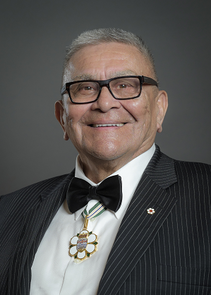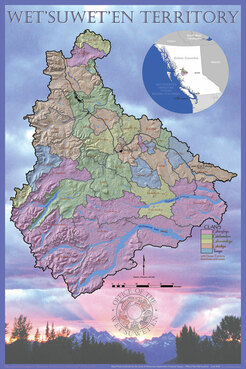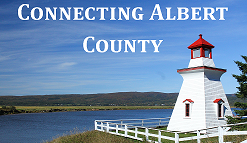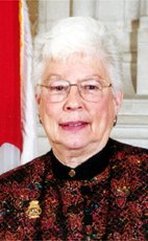likely to have heard about a new round of protests in British
Columbia around the pipeline being built there. Now under
normal circumstances a protest over pipelines isn't really a
story I would cover except for one tiny detail; It is being
organized and led by some of Canada's hereditary chiefs.
I haven't really had a chance to talk about Canada's hereditary
chiefs since 2015 when I did a short introductory article.
So what exactly is going on?
The government (which bought out the pipeline project) is
trying to get construction moving along. However, while it
got the consent of the elected chiefs of the Wet'suwet'en First
Nation, their authority only extends over the reserves and not
the traditional territories of the tribe. The use of traditional
territories is considered a matter for the hereditary chiefs of
the Wet'suwet'en. As Robert Joseph, Hereditary Chief of the
Gwawaenuk First Nation explained in a recent Maclean's
interview:
"It’s during these times that hereditary chiefs assume their responsibility over the
lands that are spoken about. In contrast, chiefs elected under the Indian Act are
primarily responsible for things that happen on reserves—like infrastructure,
housing, water, sewage, schools and those day-to-day matters that affect
membership. Their jurisdiction doesn’t flow beyond the borders of the reserve that
they’re on. That’s the situation with Unist’ot’en; they’re not on reserve—they’re on
Wet’suwet’en territory in general."
 Robert Joseph, Hereditary Chief of the Gwawaenuk First Nation
Robert Joseph, Hereditary Chief of the Gwawaenuk First Nation as the previous one) failed to get
the consent of the hereditary chiefs
to go through Wet'suwet'en lands.
The government's own policy is
clear; there must be consent of
both the elected and hereditary
chiefs for a project to go ahead.
There is a lot of reasons we have
ended up in this mess but I wanted
to focus a specific one: the
unnatural creation of the position
of elected chief in the societies of
the First Nations.
Act in the 1800s. They were meant to supplant and divide
the leadership of the tribes. This it accomplished all-to-well.
Where hereditary chief traditions have survived they are often
in conflict with the elected chiefs who possess a great deal of
power but lack the moral suasion of the hereditary chiefs.
Some online commenters have tried to downplay the problem
with imposing democracy since democracy is obviously
awesome. This argument(?) firstly ignores that societies are
most stable when they are allowed to change and grow within
their own traditions and secondly that there is nothing
undemocratic about the existence of the hereditary chiefs. In
fact, given the reliance they have on the people following them
willingly they may be the more democratic of the two. These
protests could not be organized unless a large number of
people were unhappy. And if not, the chiefs stand to lose the
support of their people which I assume they would avoid.
On January 10th the hereditary chiefs of the Wet'suwet'en
reached an agreement with the RCMP over worker access to
the pipeline's location, the continued existence of a camp set
up during the protest, and police training regarding the tribe's
traditions. The hereditary chiefs explicitly stated this deal
wasn't an acceptance of the pipeline project.
Going Forward

get around to consulting with
the Wet'suwet'en in a more
thorough manner eventually but
how are we to avoid this kind of
situation next time?
Now, the following is just my
two cents based on my own
knowledge and experience. It is
not to be taken as me telling
First Nations what to do (that is
how we got to this point in the
first place after all) but merely
a course of action to pursue if
they really want to.
counterparts. They have a unique perspective that would
benefit the governance of their tribes. It would also eliminate
the conflict between the two positions which can poison their
communities. It would also make it easier for the government
to consult with all stakeholders in the community.
While this hasn't been tried to any great extent in Canada,
there are African countries that have given their former
chiefs & kings formal roles and, in some cases, constitutional
protections of their territories. It is interesting to note that in
those countries the most they did was abolish the position the
ruler held. Canada went a step farther and actively supplanted
them and it has been a source of trouble for the First Nations
ever since.
Loyally Yours,
A Kisaragi Colour
 RSS Feed
RSS Feed





